Samsung Galaxy S8 Showdown: Exynos 8895 vs. Snapdragon 835, Performance & Battery Life Tested
by Matt Humrick on July 28, 2017 8:00 AM EST- Posted in
- Smartphones
- Samsung
- Galaxy
- Mobile
- SoCs
- Snapdragon 835
- Exynos 8895
- Galaxy S8
System Performance
Now that we have a better understanding of how the Galaxy S8’s two SoC options perform, it’s time to see how well the S8’s hardware and software work together. To evaluate overall system performance, we turn to the PCMark Work 2.0 suite, which tests the combined effects of the CPU, GPU, RAM, and NAND storage. Because it uses standard Android API calls and runs several different real-world workloads that elicit realistic behavior from the CPU governor (unlike synthetic tests that simply run one or more CPUs at max frequency), it’s a good indicator of everyday performance.
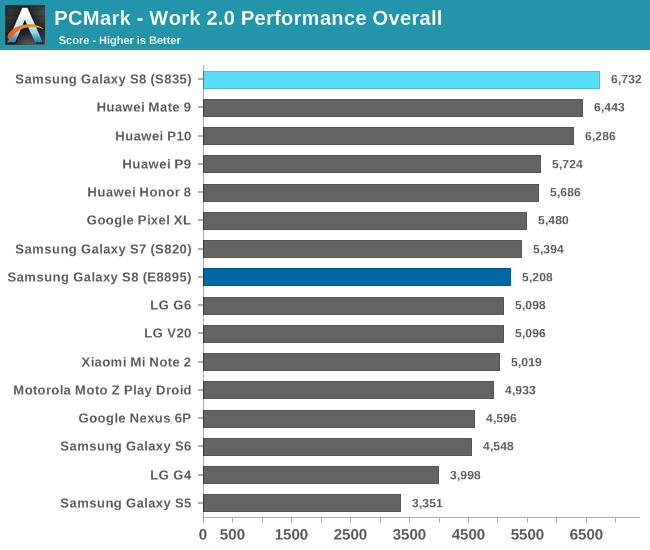
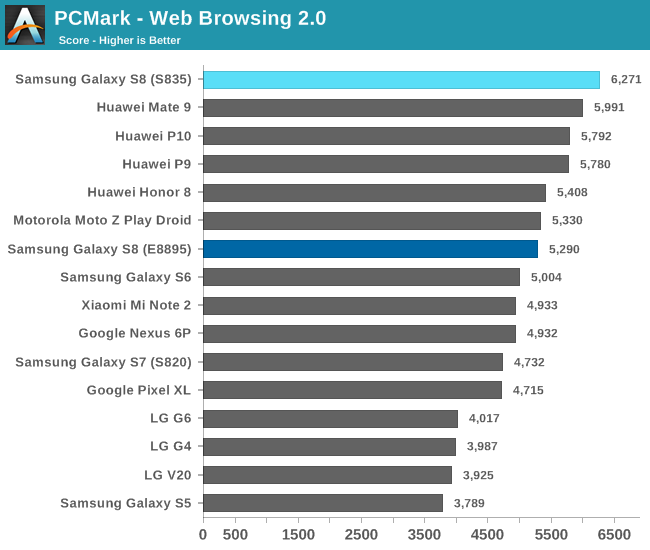
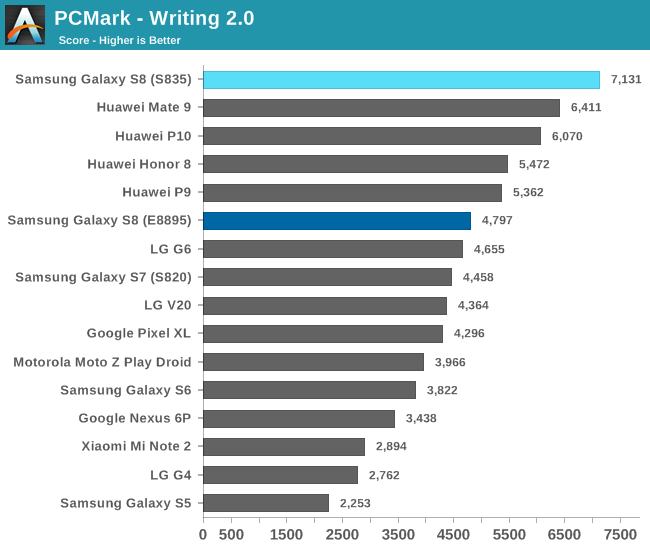
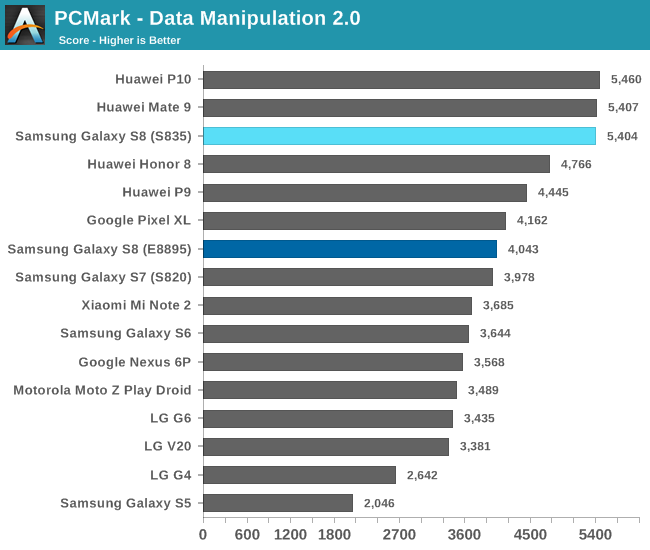
Right away we see a very noticeable difference in overall performance between the two different S8 versions. The S8 with Snapdragon 835 tops the chart, scoring better than the previous champion, the Huawei Mate 9, and outpacing the Exynos 8895 version by 29%. Not only is the E8895 S8 slower than its brother, it also fares no better overall than the older Galaxy S7 (S820). Both S8’s are faster than the Galaxy S6, however, with the S835 version scoring 48% better overall and the E8895 version squeaking past with a 15% margin. Compared to the Galaxy S5 and its S801 SoC, the S8 is 100% and 55% faster, respectively.
In the Web Browsing test, the hierarchy at the top half of the chart is largely the same, although the performance deltas are less than what we saw for the overall PCMark scores. The S835 S8 claims the top spot once again and outperforms its E8895 counterpart by 19%. The Galaxy S8 (S835) and Galaxy S5 bracket the results, with the former showing a 66% advantage. The Exynos S8 is a little slower than the Snapdragon version (19%), but is at least faster than all the previous Galaxy phones by as much as 40% relative to the S5. LG phones typically do not perform as well in this test because threads spend more time running on the lower-performing A53 or efficiency CPU cores compared to other phones, presumably a deliberate decision by LG to reduce power consumption.
The Galaxy S8 (S835) delivers the best performance in the Writing test, whose workload elicits frequent, short bursts of activity from the big CPU cores. Our previous testing showed little difference in integer IPC between the S8’s two SoCs, but the S835 model performs 49% better than the S8 with E8895. The primary difference between the two models is how the scheduler migrates threads between the small and big CPU clusters. With the E8895, Samsung is a bit more conservative with moving threads onto the M2 cores. Both S8s are faster than the LG G6 and all the phones using a Snapdragon 820 SoC, though. The S8 is also between 2x and 3x faster than the Galaxy S5.
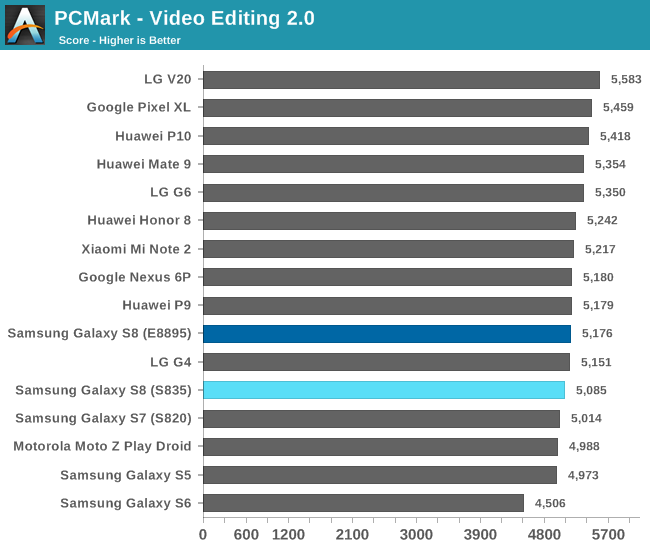
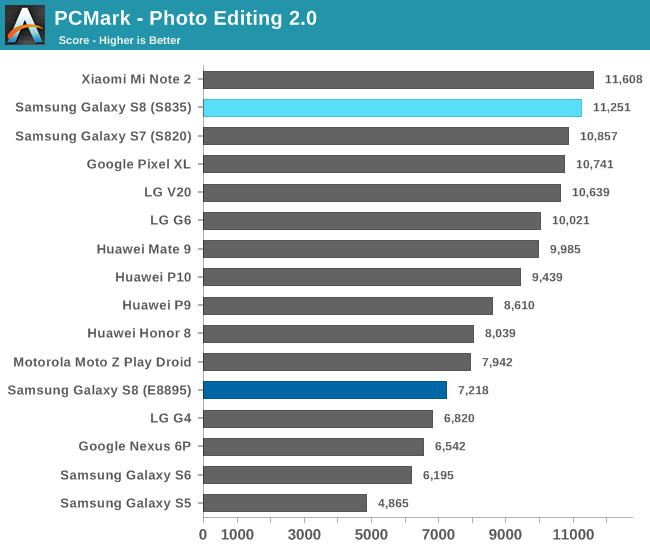
The Video Editing test’s workload is not very strenuous, so we do not see much performance variation; however, the Photo Editing test, which applies a number of different photo effects and filters using both the CPU and GPU, shows more interesting results. Qualcomm’s Adreno GPUs stand out here by combining strong ALU performance with driver optimizations. The Galaxy S8 (S835) sits among the phones using S820/S821 at the top of our chart, all sitting above the Mate 9, which is the first phone in this group to use an ARM Mali GPU. Compared to the E8895 model, the S8 (S835) performs 56% better. Curiously, the S8 (E8895) and its 20-core Mali-G71 GPU is considerably slower than the Mate 9’s 8-core Mali-G71 when running this workload.
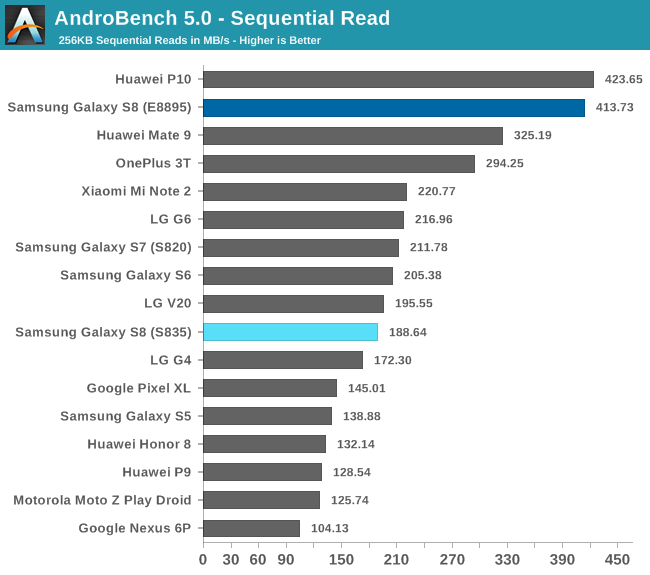
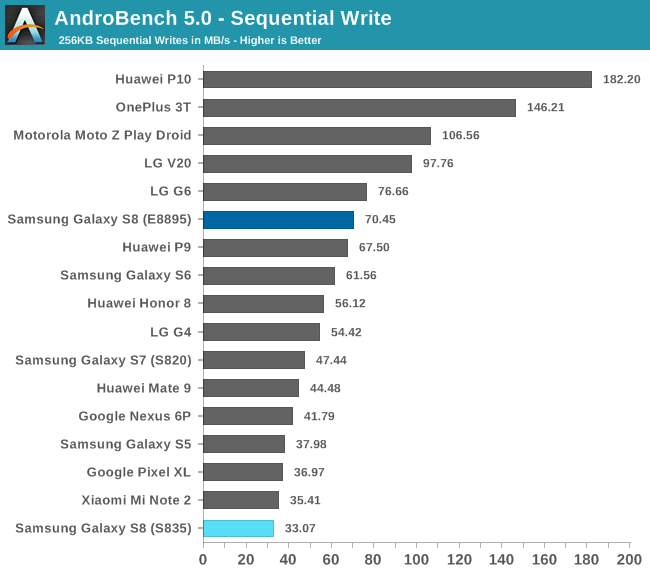
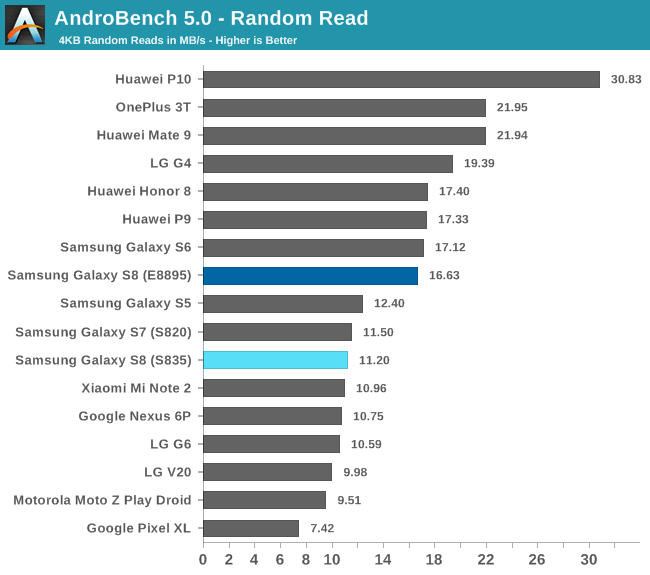
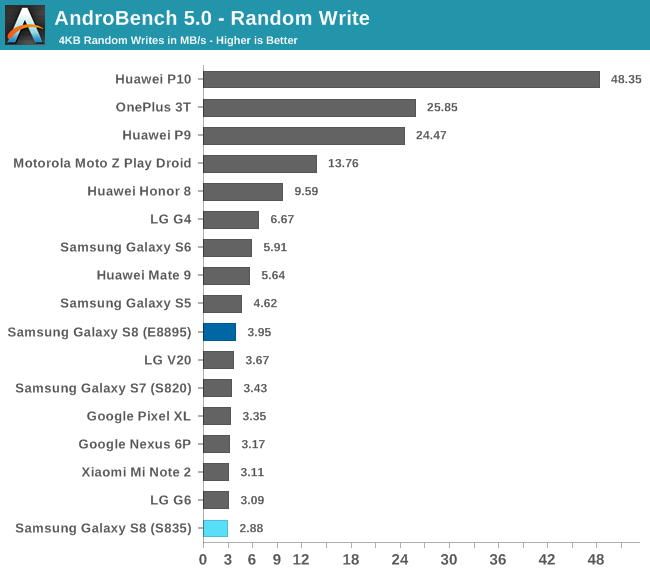
* Note: The OnePlus 3T and Huawei P10 may be using an unpatched version of the F2FS filesystem that artificially inflates write performance.
It’s common to source NAND from multiple vendors, a practice forced into the spotlight this year with NAND chips in short supply. Earlier this year, Huawei took some heat after customers began complaining of poor storage performance in its top-tier Mate 9 and P10 phones. Huawei admitted that it was using lower-performing components due to supply shortfalls, with some customers claiming they received eMMC NAND instead of UFS.
Unfortunately, even Samsung, which is one of the major NAND suppliers, is not immune to this dilemma, sourcing NAND from at least two suppliers for the Galaxy S8. Our E8895 S8 uses Samsung UFS 2.1 NAND and performs about 2x faster in the sequential read and write tests than our S835 S8 that uses UFS 2.0 NAND from Toshiba. The S8’s (S835) write performance, both sequential and random, is particularly poor. This is not necessarily a deal breaker, however, because read performance has a greater impact on user experience.
| Storage Performance (AndroBench 5.0) | ||||||||
| Seq. Read (KB) |
Seq. Write (KB) |
Random Read (KB) |
Random Write (KB) |
|||||
| 1024 | 2048 | 1024 | 2048 | 8 | 16 | 8 | 16 | |
| Galaxy S8 (S835) | 320.91 | 388.53 | 66.55 | 90.41 | 21.26 | 37.29 | 5.53 | 6.90 |
| Galaxy S8 (E8895) | 583.66 | 674.02 | 101.31 | 136.19 | 32.16 | 64.59 | 7.00 | 12.62 |
| Galaxy S7 (S820) | 275.80 | 324.24 | 90.52 | 115.43 | 19.76 | 39.65 | 5.76 | 10.56 |
| Huawei P10 | 499.35 | 541.97 | 55.73 | 96.00 | ||||
| LG G6 | 314.68 | 346.02 | 102.62 | 112.12 | 19.24 | 37.37 | 5.87 | 10.84 |
* Note: The Huawei P10 write values are crossed out because they likely are not accurate.
The table above shows how storage performance scales with larger IO sizes. While the values we use in our general tests above represent the most common IO sizes, other workloads, notably accessing media files like photos and video, will utilize larger IO transfers, so it’s important to see how a phone performs over a wider range of scenarios.
Throughput generally increases with IO size, and this is certainly true for the S8 (E8895), whose sequential read speed reaches 674 MB/s for 2 MB transfers, surpassing even the speedy P10. Performance for the S8 (S835) scales too, but its write performance remains consistently lower than other flagships; however, at larger IO sizes its throughput surpasses the Galaxy S7 (S820) when reading from storage.
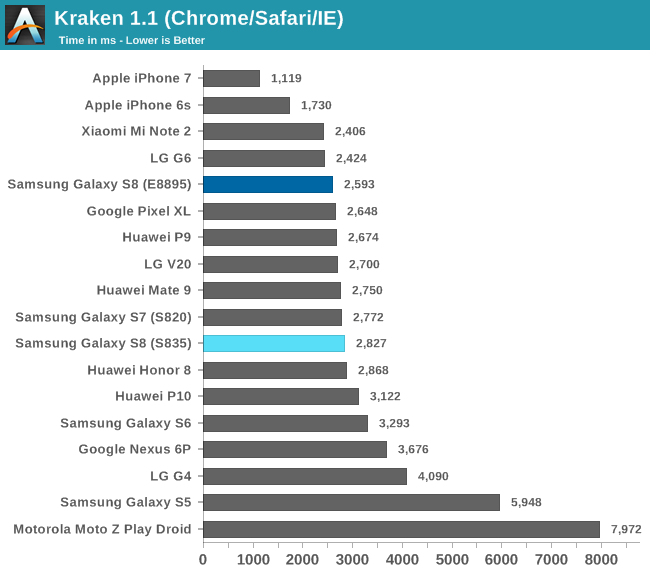
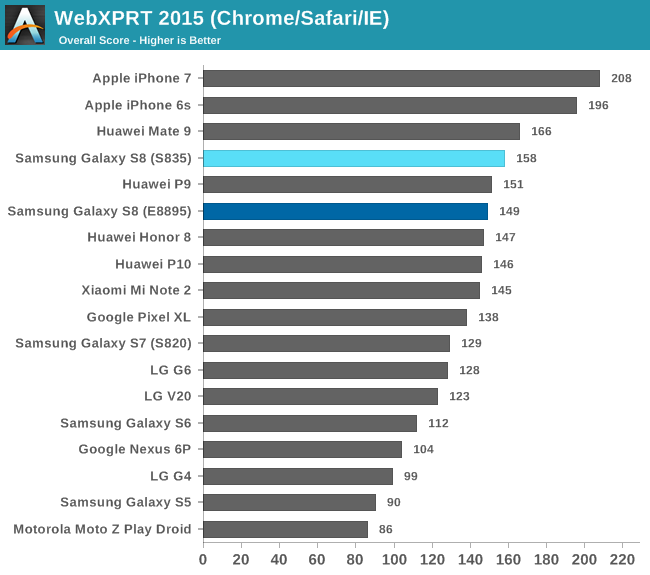
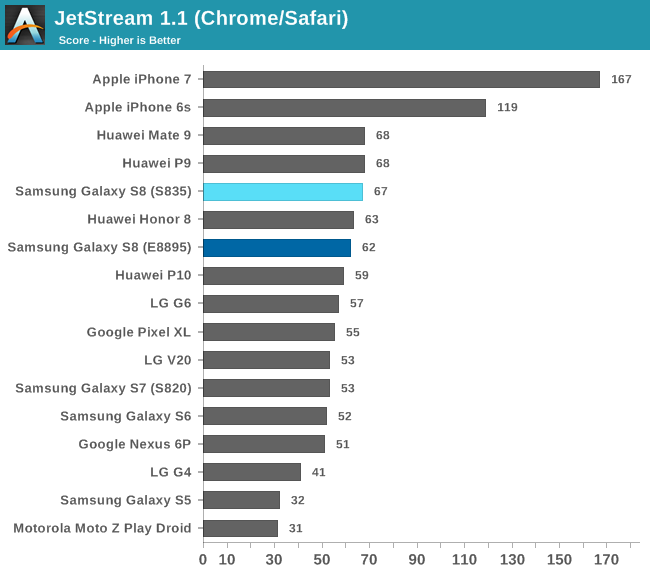
In the JavaScript tests, both the E8895 and S835 versions of the Galaxy S8 perform similarly, with their scores differing by no more than 8%. This is not surprising considering how close the M2 and Kryo 280 CPUs are in peak frequency and integer IPC. Both S8’s perform well relative to other flagship phones (all of which had the latest updates applied and were running Chrome 57), but do not distinguish themselves as the fastest currently available.
At the other end of the scale, the Galaxy S5 manages to outperform the Moto Z Play Droid (S625) and its octa-core A53 CPU configuration. The S8 offers a much faster browsing experience, of course, not just for JavaScript but also page rendering and scrolling, outperforming the S5 by an average of 2.1x in these three tests.
The Galaxy S8 performs well overall, but isn't consistently leading the pack and thus unable to cleanly establish itself as the premiere flagship in terms of everyday performance. The S835 model, despite its poor write performance, is clearly the faster of the two models when using real-world apps. I did not have much of an opportunity to use the E8895 S8 since it was a time-limited loaner, but the user interface of the S835 model remains quite fluid while swiping and scrolling through the home screen, app drawer, recent apps menu, Edge panel, and browser. The S8 (S835) is the fastest and most fluid feeling Galaxy phone I’ve ever used.










137 Comments
View All Comments
Nullify - Saturday, July 29, 2017 - link
Stupid video. Opening Apps means nothing.The better one is where they test loading large photos and applying effects in real time or rendering 4K video. iPhone 7 absolutely DESTROYS the OnePlus 5. And it's a year old phone on an older process while the 8895/835 are on 10nm.
Even funnier is watching you cry over on Ars when the iPhone 7 spanked every other phone in these App opening videos and you claimed the tests were flawed. Now that the OnePlus 5 opens Apps faster (marginally) suddenly these types of tests are valid? Hypocrite much?
Please stick around Anand. There are a lot of intelligent posters here who have a very good understanding of processor design (including the excellent staff here). I can't wait to hear the responses to your comments.
bigboxes - Saturday, July 29, 2017 - link
You fanboys are really something. Gotta protect your favorite company from the naysayers at all cost!Galid - Saturday, July 29, 2017 - link
I don't think you get it peeps, benchmarks here are sustained, opening apps is only using a small % of potential. When the apps/os starts to ask more, most of the android phones have the same problem, underclocking. Yep, it's easy to make a blazing fast processor but it's another feat to make it survive 100% load without underclocking.You might be able to put an 8 cylinder engine into a honda civic and use it to drive around town but push it a little bit too much and the car will suffer heavily. The frame won't support the torque.
Irish_adam - Saturday, July 29, 2017 - link
First of all your beloved iphone will also drop its clock rates after a couple of minutes because they are all passively cooled and cant sustain high clocks. Second of all i cant believe people still look at these benchmarks and think that its the hardware thats making the difference. We will probably never know who has the best processor because unless you can still android on an iphone or ios on an android phone we will never be able to determine how much an affect the related drivers and software are having on the scores. Its like running a benchmark on a mac vs a windows PC, you could have identical hardware but that doesnt mean the scores will be the same or even close.Irish_adam - Saturday, July 29, 2017 - link
*installakdj - Monday, July 31, 2017 - link
It’s fairly simple to play the same game on the different hardware, compare from there. Plenty of parity in apps as well ...plenty that 'tax' the SoC and will throttle faster in poorly designed hardware.nikon133 - Sunday, July 30, 2017 - link
I'm a bit surprised that so many are still so focused on raw power. Smart phones have matured so nicely that many of these performance differences are really becoming pointless for majority of users.My colleague - arguably power user - still drives Galaxy S6 and runs everything he requires in very agreeable manner, including Kodi media center with handful of add-ons. I expect he will shift to S8 this year, since his phone is around 2 years old... but that's really just because he can, not because he needs to.
On the other hand, my other colleague has recently purchased new VW Tiguan, and after having fair share of problems between iPhone 7 and cars' infotainment, he has decided to move to S8. He is long term iPhone user - from iPhone 4, if memory serves - and one of company's executives, so cost is not an issue, and he has been replacing his iPhones annually. Definitely not biased towards Android, but currently very happy user of one - according to him, Android Auto is just so much better and more reliable than Apple CarPlay, in his experience (limited to Tiguan). I don't know all the details about his experience with either, but gentleman is one of our company's leading IT specialists and I would expect that problems he was experiencing with iPhone were not typical end-user nonsense.
Which leads me to my conclusion - ultimate performance is nice to have, but only if phone doesn't sacrifice functionality. I was iPhone user, before I have switched to Windows Phone (nd still am using Lumia 950 XL as my personal phone)... but judging from experience with my work-issued Nexus 5X, Android is maturing really nicely. Even with aging hardware such as 5X is (Snap 808), phone is still smooth as with my work needs, and really reliable. First time ever I'm starting to think that my next personal phone will be Android.
tamalero - Saturday, July 29, 2017 - link
It just shows that certain tests are heavily optimized in IOS.Because if you see the rest of the benchmarks.. the Galaxy S8 pretty much is above the iphones in most tests.
Galid - Saturday, July 29, 2017 - link
They are not optimized, the iPhones doesn't underclock while in sustained benchmarks, every android phones do underclock.Nshaikh - Saturday, July 29, 2017 - link
Sorry Dude but thats not true enough to fool people around, well the reality is that since laat year iOS device as in Appla has faced a problem of Sales in India besides Android is always a life saver and speaking about Samsung well in Reality my S6 Edge is way better than any of your iOS devices even the latest one does have the same clearity but lacks in switching back and even u can't shut apps off or can't install any pirate softwares without jail break means to say rooting an Android Device and making it a PC is possible but even after Jail-Break u can't make an Apple device turn into Android but an Adroid can be coverted to any platform...The Android powered device carries Hardware that ate Super cool to Competite the Apple iOS device.